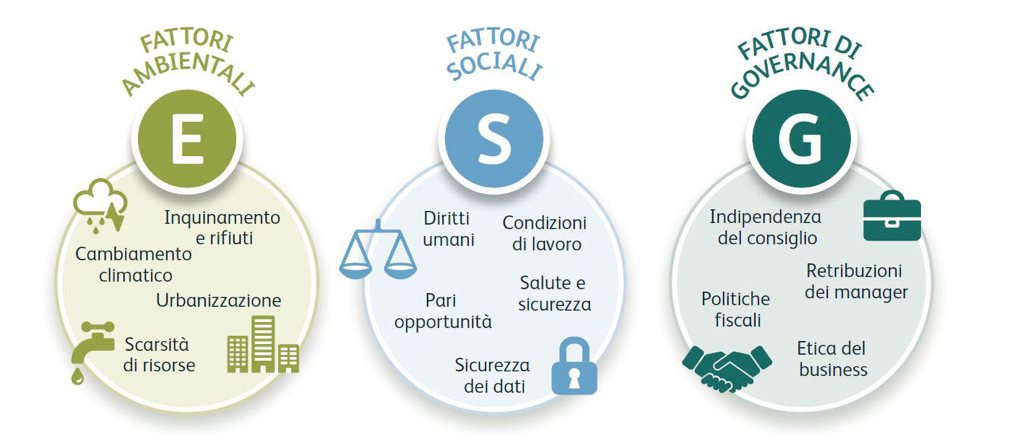
The path created by Egualia in collaboration with the Civita, Nomisma and Nomos Association aims to provide member companies with the tools to face the main environmental, social and economic challenges of the sector
 The world is called to face important challenges related to sustainability, such as climate change, demographic aging and inequalities which require radical solutions and confront companies with the need to operate in compliance with the three pillars of sustainability - environmental, social and economic – to make good long-term investment decisions and preserve their value over time.
The world is called to face important challenges related to sustainability, such as climate change, demographic aging and inequalities which require radical solutions and confront companies with the need to operate in compliance with the three pillars of sustainability - environmental, social and economic – to make good long-term investment decisions and preserve their value over time.
This awareness inspired the training project on sustainability and ESG factors inaugurated today by EGUALIA, in collaboration with the CIVITA Association, the NOMISMA company and the NOMOS Parliamentary Studies Centre. The project aims to create a thematic study path, specific for companies in the pharmaceutical industry, in order to provide all participants with the theoretical and practical tools relating to the use of ESG factors and necessary for presenting sustainability reports.
«Companies are more likely to be successful and generate returns if they create value for everyone they interact with and for society in general, including the environment. For this reason, many companies are reorganizing their business models to integrate sustainability into corporate strategies and are starting to consider environmental, social and governance reporting not as a regulatory burden, but as a tool to attract investors and financing. The companies in our sector do not want to be caught unprepared for the new challenges by equipping themselves with the right tools to calibrate and manage their impact in environmental, social and governance terms". explains the president of Egualia, Enrique Häusermann, commenting on the initiative.
«The meetings scheduled as part of the project aim to raise awareness among companies on issues relating to sustainability and ESG factors, promoting a change of cultural paradigm – explains Boris Popov, economist and Project Manager of Nomisma -. Knowledge of the stringent regulations promoted at European level and their impact on the way of doing business in the near future will help companies become aware of the new market opportunities that may arise from change - product development, investments, supply chain management, certifications , marketing and communication, access to credit – and will enable them to prepare their own Sustainability Report for the dissemination of non-financial information relating to their business».
To complete the path, the testimonies of contacts from other sectors. To open the roundup Simonetta Giordani, Secretary General of the Civita Association - a non-profit organization of companies and research institutions, active in public-private dialogue in the sectors of culture, tourism, made in Italy and sustainability - and expert in Corporate social responsibility. «Companies – he explained – must increasingly adopt an approach in the vision and management of the company oriented towards the search for a balance between economic profit and the generation of "shared value" with internal and external stakeholders, i.e. with all subjects who can influence or be influenced by the activity of the company itself. From this point of view - concluded Giordani - the theme of the cultural declination of sustainability is current and strategic, since our country possesses an immense cultural heritage, which can represent a unique terrain for experimenting with new sustainability policies for companies and their own community».
 «We are talking about a future that has already been written». comments Licia Soncini, president of the Nomos Parliamentary Studies Centre and director of Atlantia, who will intervene in the course both with her testimony and with a specific regulatory focus on the pharmaceutical sector. «The new European regulatory framework currently being defined will place sustainability increasingly at the center of discussions between intermediaries, managers and investors. Sustainable finance will be the leitmotif of the economic market. Companies that are not virtuous from a social and environmental point of view could, for example, find it difficult to access credit, while companies that will make sustainability their own driver, with measured and reported positive impacts, will derive benefits and growth continuity".
«We are talking about a future that has already been written». comments Licia Soncini, president of the Nomos Parliamentary Studies Centre and director of Atlantia, who will intervene in the course both with her testimony and with a specific regulatory focus on the pharmaceutical sector. «The new European regulatory framework currently being defined will place sustainability increasingly at the center of discussions between intermediaries, managers and investors. Sustainable finance will be the leitmotif of the economic market. Companies that are not virtuous from a social and environmental point of view could, for example, find it difficult to access credit, while companies that will make sustainability their own driver, with measured and reported positive impacts, will derive benefits and growth continuity".
Note: ESG stands for Environmental, Social and Governance and refers to three central factors in measuring the sustainability of an investment. This approach derives from the concept of "Triple Bottom Line", also known as "People, Planet and Profits" (PPP), introduced in the 90s and according to which companies should not focus only on "Profits", but on each of the three “P”, which are equally important to the sustainability of any business venture. This concept evolved into ESG factors, which are now the cornerstone of Sustainable and Responsible Investing (SRI).





